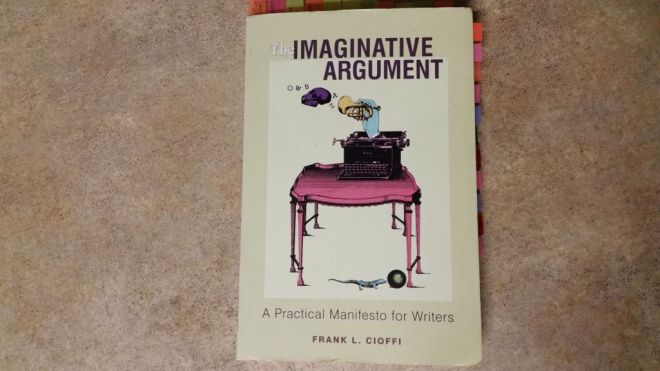
BreakawayConsciousness
Zy Marquiez
December 7, 2016
This book is absolute dynamite.
The Imaginative Argument – A Practical Manifesto For Writers by Frank L. Cioffi is an unprecedented venture into boundless possibilities that lie on the other side of conformity for writers.
Cioffi stacks the book to the hilt with a vast amount of practical, thoughtful, yet incisive information that allows individuals to see the multitude of possibilities available in argumentation, while still leaving the reader with the versatility to focus and employ their own style in their writing repertoire.
Sourcing authors such as Orwell, Goffman, Benedict, Updike, James, Nabovok and more, the author helps the reader analyze them and view their notable writing idiosyncrasies for the strengths they were, also showing the vast range these writers employed.
The Imaginative Argument is an outside the box, or better yet, a NO-box, type of book that sets depth charges to foundations of traditionalism and strives for something imaginative, something greater, something more meaningful.
Cioffi’s skill in this book is a mixture of equal parts mad scientist and academician that employs mathematical precision merged with the range of an artist who employs the universe as its canvas. A true perfect fusion of the left and right brain to boot.
That is very, very rare in any type of book, as usually books gravitate towards either taking a polarizing approach either being mechanical, or overly imaginative. This is one reason why the book appeals to me.
Covered within the confines of this book are all of the major parts of constructing an essay: a solid foundational introduction, a consideration of the audience which is focused on quite a bit throughout the book, a foray into the writing process, a focus on the thesis, arguments, style, and much more.
Even provided at the end of the book are additional sample essays and writing prompts which serve to further one’s practice.
In its totality this book offers a lot of ideas for consideration in respects to writing. Cioffi’s unique and no-holds bared approach serves to engage the reader quite saliently, also providing a veritable mixture of do’s and don’ts that are not only practical but useful.
Cioffi created an absolute masterpiece in the field of creative argumentation, and for that he should be applauded at length.